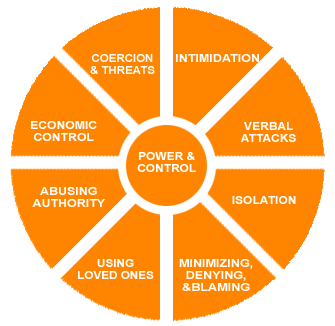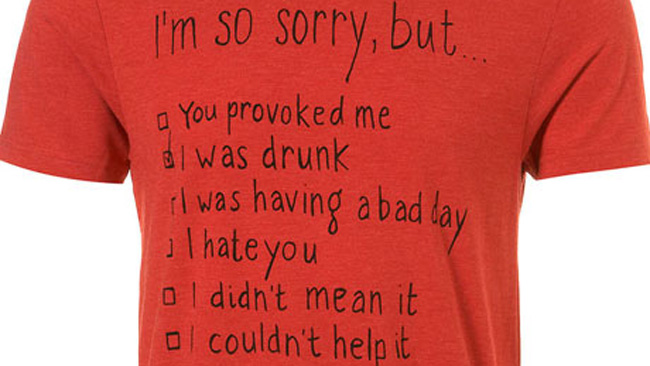Domestic Violence
Domestic violence is a mechanism through which a person tries to acquire coercive control over the other. The abuser adopts a number of strategies to exercise this control of domestic violence. Some are mentioned as under:

Language
- Abuse
- Telling lies
- Leaking private information
- Playing mind game using words
Physical Violence
- Hitting
- Scratching
- Shaking
- Physical Force
Sexual Coercion
- Forced Sex
- Refusing birth control
- Forced contact despite STD
- Making sexual comments
Threatening
- Threat of physical violence
- Threat of suicide
- Threat of police complaint
- Threat of financial insecurity
Denial and Blame Game
- Denial of any coercion
- Undermining the incidents
- Blaming the victim for the disarray
- Blaming other factors like alcohol, drug or stress
Intimidation
- Looks, action and gestures
- Smashing, destroying or stealing assets
- Abusive language
- Weapon display
Technology
- Sending disturbing messages
- Breaking into social network
- Using mass media as a tool of coercion
- Sexually loaded communication
Use of Social Standing
- Use of high connections
- Job profile
- Money power
- Social circle

Many intermediary occurrences might convince the abuser towards reconciliation, which may be tried through various strategies mentioned as under:
- Hearts and flower approach
- Super-Dad approach
- Revival approach
- Sobriety approach
- Counselling approach
- Sympathy approach
Why domestic violence victims don’t leave their partner?
- Children
- Society
- Attachment despite abuse
- Financial insecurity
- Fear of loneliness
- Sympathy with the abuser
- Lack of familial support
- The threat of police complaint
When should you decide to quit domestic violence?

It is estimated that 95% of domestic assault are committed by men. This state of abuse may start in any normal relation, including normal persons over a period of time. There are certain CODE RED signs which one needs to identify while deciding the final quit. Some of them are mentioned as under.
- Jealousy
- Threat of violence
- Use of force during arguments
- Altogether different core-values
- Use of past incidents as ammunition to present fight
- Keeping scores in relationships
- Enjoyment and justification of fight
- Refusal to change
- Use of ‘I/ME/MY’ instead of ‘WE/US’
- Feedback insulation and absolute belief of right self stand
- Bad relation with family of self
None of the above is a rule absolute. Nobody is perfect. If you are eyeing this article, there might be something wrong in your relationship. Also, there lie a chance that you would find a few of the above-mentioned points in your relation. Also Read: Phases of Abusive Marriage
But always remember, relations are precious. If you can’t strengthen them, please don’t loosen them too.
Time is the biggest healer and preacher,
An optimist mind conquers the world!



like so, bubble booty pics and keep your head up, and bowling bowl on top of the ball.
Within the occasion you can email myself by incorporating suggestions in how you have produced your web site search this brilliant, I ad personally have fun right here.
I think this is a real great blog post.Much thanks again. Want more.
Valuable information. Lucky me I discovered your web site by chance, and I am stunned why this coincidence did not came about earlier! I bookmarked it.
I value the article.Really thank you! Really Great.
You are my breathing in, I own few web logs and infrequently run out from to post.
Wow, great blog.Really looking forward to read more. Great.
You have brought up a very fantastic points , thanks for the post.
Perfectly written written content , regards for selective information.
Sweet website , super pattern , rattling clean and use friendly.
Pretty! This has been a really wonderful article. Thank you for providing this information.
Well I definitely liked reading it. This subject procured by you is very useful for accurate planning.
It as not that I want to duplicate your internet site, but I really like the design. Could you tell me which style are you using? Or was it tailor made?
Thanks a lot for sharing this with all of us you actually know what you are talking about! Bookmarked. Kindly also visit my web site =). We could have a link exchange arrangement between us!
Really appreciate you sharing this article post.Much thanks again. Really Cool.
I was recommended this blog by my cousin. I am not sure whether this post is written by him as nobody else know such detailed about my difficulty. You are incredible! Thanks!
It as very easy to find out any topic on web as compared to textbooks, as I found this piece of writing at this website.
Wonderful work! That is the type of info that should be shared across the web. Shame on Google for no longer positioning this put up higher! Come on over and seek advice from my website. Thank you =)
Some really nice and useful information on this website, likewise I think the design contains wonderful features.
Thank you for your blog post.Thanks Again. Keep writing.
I wanted to thank you for this excellent read!! I absolutely loved every little bit of it. I have you book-marked to look at new stuff you post
It as not that I want to duplicate your web site, but I really like the style and design. Could you tell me which style are you using? Or was it custom made?
You can certainly see your skills in the paintings you write. The world hopes for even more passionate writers such as you who are not afraid to say how they believe. Always go after your heart.
Really enjoyed this blog post.Thanks Again. Want more.
You realize so much its almost hard to argue with you (not that I actually will need toHaHa).
Major thanks for the blog post.Really looking forward to read more. Keep writing.
This very blog is without a doubt interesting and besides diverting. I have picked up helluva useful stuff out of this amazing blog. I ad love to go back every once in a while. Thanks!
Looking around While I was surfing yesterday I noticed a great article concerning
The account aided me a applicable deal. I had been tiny bit acquainted of this your broadcast offered shiny
It was big joy to detect and read this comprehensive blog. Fantastic reading!
Wow! Thank you! I always needed to write on my website something like that. Can I take a portion of your post to my website?